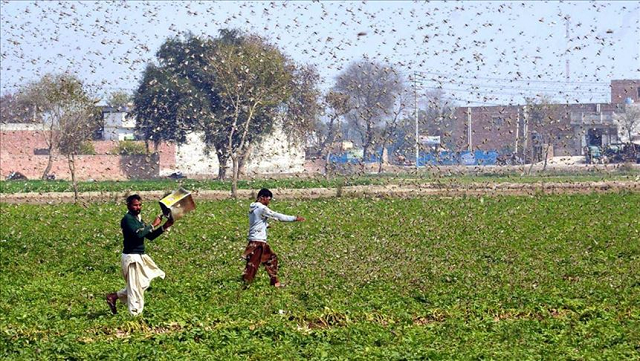Pakistan stands vulnerable to a ‘severe’ locust attack
The aerial spray wing of the Plant Protection Department is completely inactive

Pakistan is currently vulnerable to a severe locust attack, which could cause significant damage to the country's agricultural sector and threaten food security.
The Plant Protection Department of the federal government, which was responsible for controlling the spread of locusts, was facing a major setback as 18 aircraft that were previously used for aerial spraying to neutralise locust attacks were now inactive.
The Plant Protection Department had procured these aircraft for tens of millions of rupees, using them for aerial spraying in various regions.
However, in 2021, one of the aircraft crashed in Rahim Yar Khan, and since then, all the planes had been grounded. Currently, 10 of the aircraft were stranded in Karachi, while eight in Lahore, and it was feared that lack of proper maintenance had caused further damage to the planes.
The Plant Protection Department's air fleet consisted of Beaver, Cessna, and Fletcher aircraft. The Fletcher and Cessna aircraft fleet was grounded in 2004, and the Beaver aircraft fleet in 2021.
The aerial spray wing of the Plant Protection Department became completely inactive due to the grounding of the planes, leaving the country vulnerable to locust attacks.
Pakistan faced its worst locust outbreak in nearly three decades in 2020-21, which caused severe crop yield reduction or even total failure in many areas. The desert locusts affected 38% of Pakistan’s land area, leading to significant damage to food crops, including wheat, maize, and vegetables. The locusts damaged over three million hectares of crops, resulting in losses of around $3 billion, according to the Pakistan Agricultural Research Council data.
In response to the locust crisis, Pakistan collaborated with China to control the locust attack, but these latest revelations exposed the authorities’ preparedness to deal with the situation.
The looming threat of a severe locust attack in Pakistan's primary food-producing regions had the potential to inflict significant damage on the agriculture sector. The devastation of locust swarms could be profound, as they were equipped with an insatiable appetite that could sweep through green fields, leaving a trail of destruction in their wake.
In the absence of effective measures to control their spread, farmers were faced with the perilous prospect of an infestation that could potentially wipe out entire crops, thereby posing a severe threat to food security in the region.
Locusts, a species of grasshoppers, could inflict extensive damage to crops and vegetation when they swarm in large numbers. The challenge of controlling these pests was compounded by their ability to travel vast distances and reproduce rapidly.
While pesticides remained the most effective method of control, they had detrimental effects on the environment and human health. Consequently, there had been a surge in interest in biological control methods that involved introducing natural predators or pathogens to target locusts without causing collateral damage to other species.
Moreover, early warning systems and vigilant monitoring could detect locust outbreaks and allow for timely and targeted intervention. Therefore, a combination of different strategies and a coordinated effort among nations and organisations was vital to mitigate the impact of locusts on agriculture and food security.



















COMMENTS
Comments are moderated and generally will be posted if they are on-topic and not abusive.
For more information, please see our Comments FAQ